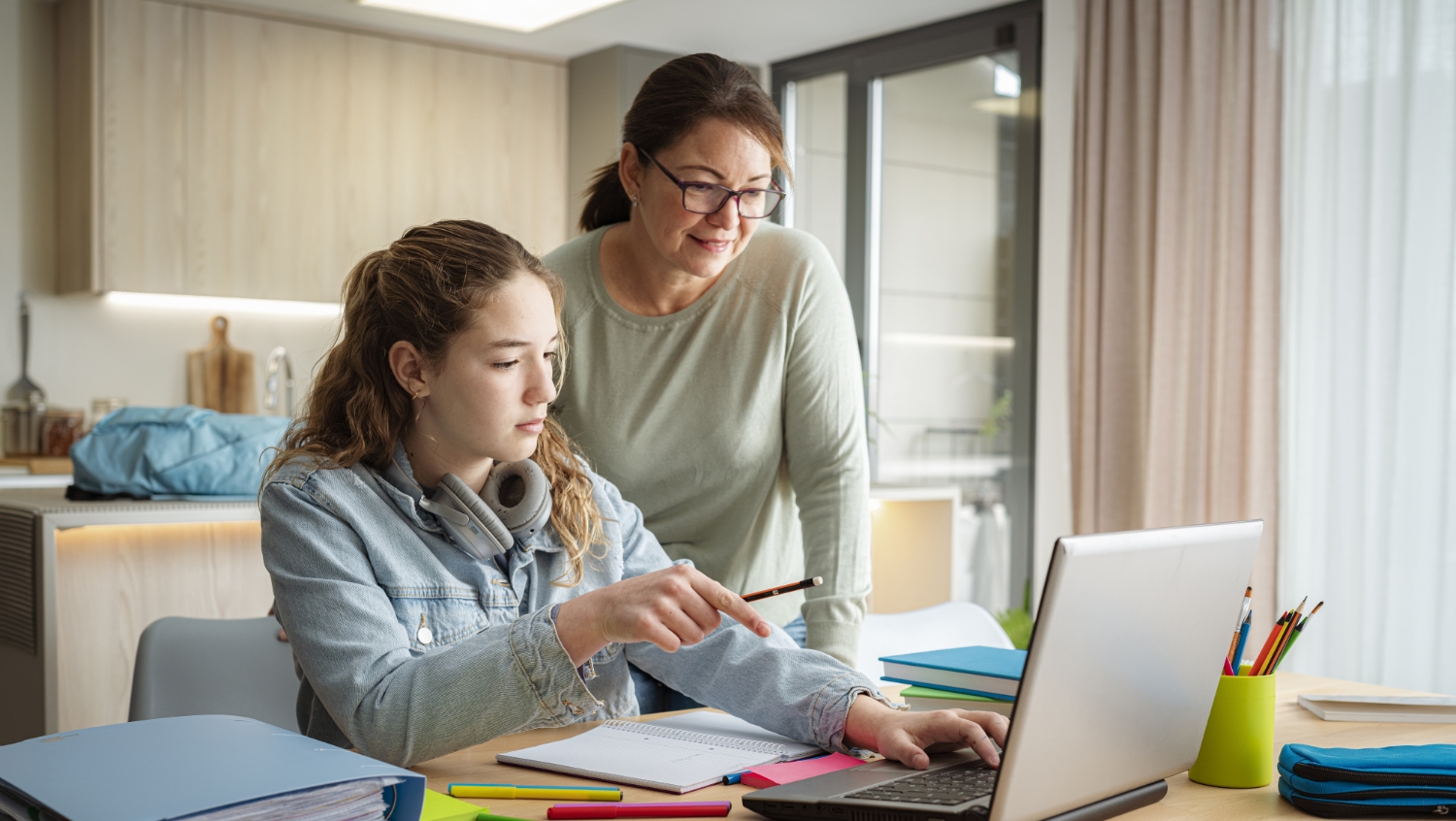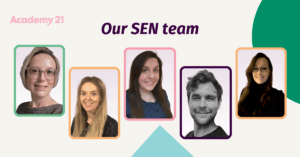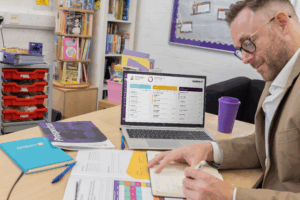Meet our SEN team at Academy21
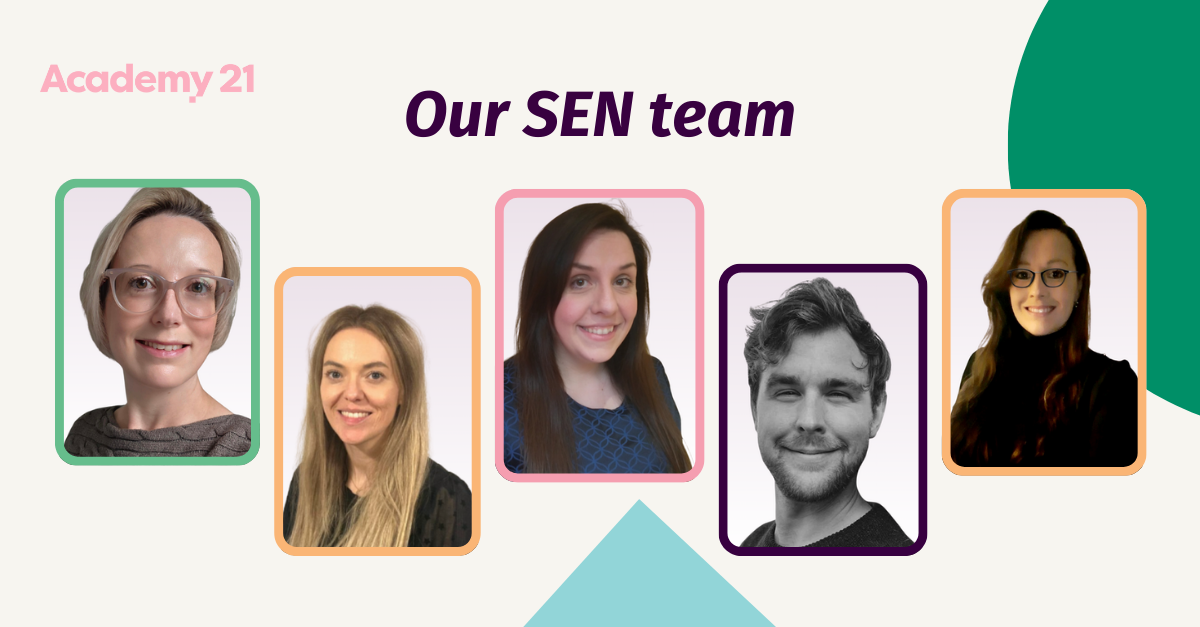
As the UK’s leading online alternative provision provider, we welcome thousands of students across England and Wales every year, and many of these students have special educational needs. Every day, our goal is to equip them with the tools they need to thrive academically and emotionally despite these barriers. That’s why, aside from our DfE-accredited, high-quality provision, we have a dedicated SEN support team on hand to offer personalised support to every student.
And because we know how important it is to put a face to the name and don’t just talk the talk, we caught up with our SEN experts to get a glimpse into their world. From what their day-to-day looks like, to their passions and goals here at Academy21, we asked them all the burning questions. Without further ado, here are some of the brilliant, caring professionals helping our students thrive every single day:
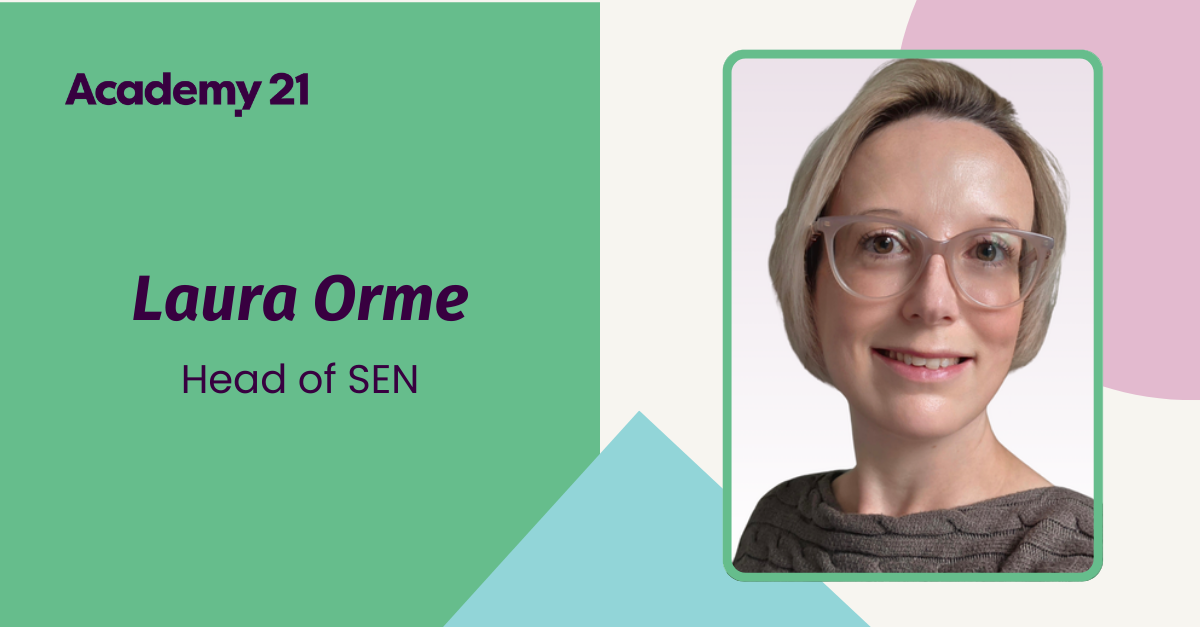
With more than 15 years of experience in special educational needs, Laura has built her career around ensuring that every student gets the support they deserve. From setting up an autism provision to leading SEN at an independent school, her diverse experience has given her a deep understanding of how to make education work for each unique young person. She’s even qualified in SEN law through leading body IPSEA, making her a great advocate for support at every stage.
When Laura’s not working with our families at Academy21 and King’s InterHigh, you’ll find her exploring Scotland with her family, feeding her love of history through castle visits, fundraising for charity, and crafting lovely handmade knitwear.
What’s your role on the SEN team, and what does your day-to-day look like?
As Head of SEN Services, my role is extremely diverse. First, I am responsible for ensuring the special educational needs of students on our register are met, from the admissions process to their inductions and through their full educational journey with us. To do this, we ensure that all information is collected from parents and carers to provide teaching staff with the best way of working with that student.
I support a team of SEN lead practitioners, BACP registered counsellors, and SEN teachers, so I check in with them daily on their responsibilities, ensuring the smooth and efficient running of the team. I work closely with the exams team to ensure students’ access arrangements are in place, and I also deliver training on specialist areas such as ASC, ADHD, attachment, and trauma. The main part of my day-to-day work that I enjoy is working directly with families and young people to ensure their Academy21 and King’s InterHigh journey meets their needs.
What inspired you to specialise in supporting students with special educational needs?
The answer to this is twofold. Whilst studying for my medical degree in human genetics, I was able to work with a pioneering team who were studying genetic components of autism. This sparked my curiosity in neurodiversity, and I continued my postgraduate studies at Great Ormond Street Hospital. Ever since, I have wanted to understand neurodiversity and the impact it has on young people.
Additionally, I have a rare physical disability myself, and only 10% of people with my condition can walk. I am extremely lucky that I have had a fantastic medical team around me, and at 42, I am able to enjoy walks and activities with my outdoorsy family! I attended a mainstream school in the era before the current drive we have on disability awareness and accessibility, and had some negative experiences where education wasn’t supporting me the way I needed it to. So, I have been inspired to use a mix of my own personal experience and my academic and leadership experience to specialise my career in striving for better understanding and inclusive practice for SEND.
What tips would you give parents to help them support their child with SEN at home and in school?
There is no one tip I can give, as every child’s needs are unique and individual to them. What works for one family won’t necessarily work for another. That being said, the main tip I would give is to always, always seek support, whether from specialists, other family members for respite, or family support services. I also parent a child with SEN myself, and one thing I have learned in our journey is that no one can do it alone. It is a complex and stressful world to navigate once that diagnosis is given, and parents need to know that it is okay to find it hard — because it is hard. But also know that you are not alone; so many other parents and carers have faced similar battles and struggles to secure SEN support that is right for their child.
And finally, listen. One thing we can forget to do as parents with multiple responsibilities is to listen to our child’s wants and needs but also listen to what they perhaps aren’t telling us (or listen to what their behaviours show us, but they aren’t saying). Try everything: some strategies won’t work, and that’s okay too.
What’s one thing you wish more people understood about SEN support?
SEN support, particularly in education, can often get a ‘bad name’ due to difficulties nationally in meeting children’s needs. By the time many of our parents of children with SEND get to Academy21 and King’s InterHigh, they have fought an often-exhausting battle to secure the support their child needs.
This can make people wary of SEN teams, as the traumatic experience can erode trust. There are some fantastic SEN specialists out there who truly want to make a difference to education (and I count myself as one of them!), but limitations and funding issues can sometimes mean that children are ultimately let down.
The beauty of Academy21 is that we have the flexibility to make an extremely comprehensive SEN support structure. Our “universal offer” (often called “ordinarily available provision” in school) and our Enhanced Support Services ensure all students have access to targeted support to meet complex needs, removing the barrier that can often prevent children with SEND from accessing services.
What’s unique about working in SEN at an online school?
I have worked in bricks-and-mortar mainstream, specialist ASC resourced provisions, and an independent SEN school. The major difference online is calm. As a Head of SEN, I know that as SEN staff walk the corridors, they will be interrupted by multiple staff for queries, support, input, and training. By the time they get to where they were going, their to-do list has grown exponentially. That is not to say the to-do list isn’t long in an online school, and fellow staff can reach us at any time virtually. But at Academy21 and King’s InterHigh, we can also prioritise our responsibilities, which allows for a calmer headspace to better support students when tricky situations arise.
I have worked in settings with a lot of students experiencing EBSA (emotionally based school avoidance), and the online school world is amazing for allowing them to access education. They’re able to reach their potential in a safe and secure environment due to the calmness and flexibility we see that online learning provides.

From our wellbeing workshops to our academic support courses, Aimee oversees our broad range of Enhanced Support Services at Academy21 and King’s InterHigh. She’s a trained SENCO with experience across mainstream primary, secondary, and special schools, and she’s qualified in British Sign Language too. Aimee’s philosophy is simple: all children deserve to reach their full potential whilst enjoying their learning in a safe and caring environment.
Outside of Academy21 and King’s InterHigh, Aimee loves to spend her time enjoying long walks with her dog, trying out new recipes (though she’s happy to leave baking to the experts!), and indulging her love of dance.
Can you tell us about your role within the SEN team? What does your day-to-day look like?
My job role is SEN Services Hub Lead, which I thoroughly enjoy! I oversee our wonderful Enhanced Services courses. These include academic support and wellbeing support. The academic support courses we offer are: Literacy Support, Numeracy Support, Study Skills, English as an Additional Language and Education Coaching. Our wellbeing courses are: counselling, wellbeing mentoring, social skills and anxiety management courses.
What inspired you to specialise in supporting students with special educational needs?
Supporting students with special educational needs has always felt more like a calling than a career choice. Early in my teaching journey, I worked with a child whose learning differences had gone unnoticed. Once the right support was put in place, the change was remarkable – not just academically, but in their confidence and overall wellbeing. That experience highlighted how crucial early identification and tailored support can be, and it sparked a passion that has guided my work ever since. I believe every child deserves to be understood, empowered, and given the opportunity to succeed in their own unique way.
What’s unique about working in SEN at an online school?
Online education opens up new possibilities for students with additional needs. For many, learning from home reduces social pressures, sensory overload, and anxiety triggers. The virtual setting allows us to personalise support more flexibly, whether that’s through tailored timetables, one-to-one sessions, or alternative communication methods.
That said, it also means we work harder to build strong connections and spot the subtle cues we might easily notice in a physical classroom. Collaboration with parents and carers becomes even more important, and that strong partnership is one of the things that makes online SEN support especially meaningful.
What do you enjoy doing outside of work? Do you have a fun fact or hidden talent you’d like to share?
I have a little dog, who I adore, so I spend lots of time walking him. I also love being in the kitchen and trying out new recipes, however, baking is not my forte but eating anything sugary definitely is! My passion is dance, so any opportunity to watch some new choreography I adore!
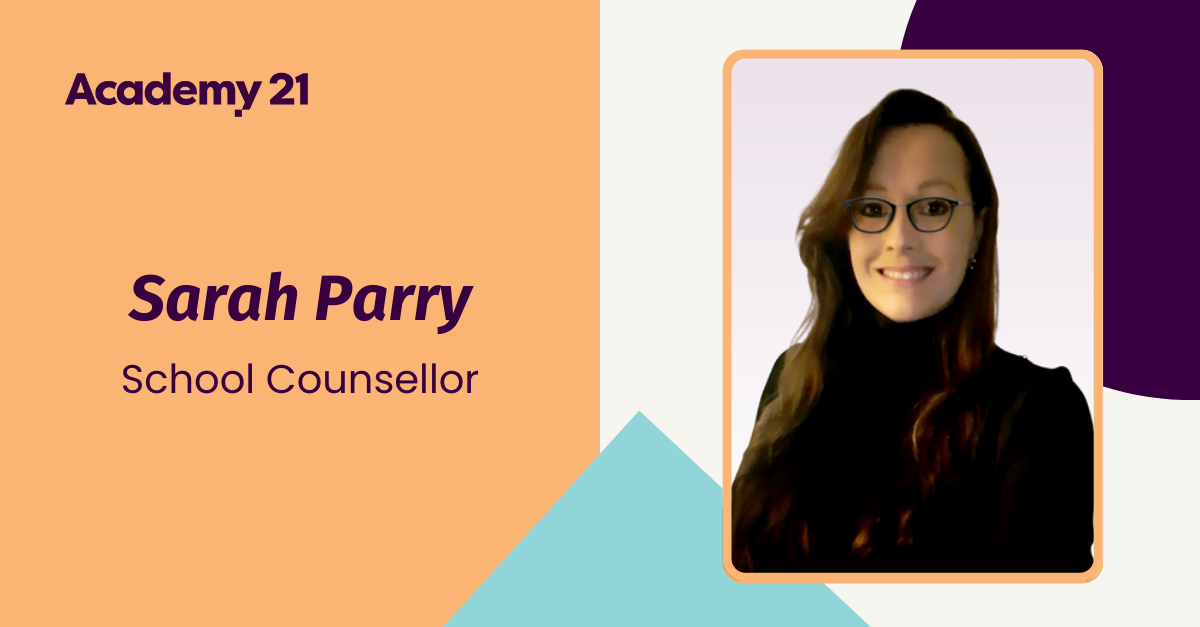
Sarah is one of our wonderful SEN teachers and school counsellors at Academy21 and King’s InterHigh, creating space for students to explore their emotions and develop the skills they need to be confident and happy. Through one-to-one counselling and specialist courses like anxiety management, she combines psychoeducation with practical support, helping students better understand themselves.
Her interest in wellbeing extends beyond work into her personal life, where she loves exploring everything from neuroscience to nutrition to meditation. Sarah is also an art lover, animal enthusiast, and regular participant in charity events.
What’s your role on the SEN team, and what does your day-to-day look like?
I am honoured to be one of the school counsellors and SEN teachers at Academy21 and King’s InterHigh. I provide one-to-one counselling for students, helping them to explore their emotions in a safe, compassionate space. Moreover, I deliver specialised courses, such as wellbeing mentoring and anxiety management. Lessons encompass exploring psychoeducation, supporting students to develop key skills in wellbeing, and managing anxiety.
What inspired you to specialise in supporting students with special educational needs?
I have always seen the role of a teacher as incredibly rewarding, specifically when working with children with special educational needs. It allows me to make a significant, lasting impact on student development and wellbeing, fostering personal growth, empowerment, and empathy to help students reach their full potential.
What tips would you give parents to help them support their child with SEN at home and in school?
I would encourage parents to:
-
- Be their child’s advocate
-
- Create a positive environment
-
- Have consistent communication
-
- Establish routines
-
- Focus on their strengths
-
- Use visual aids to help their understanding
-
- Develop a strong support network
-
- Collaborate with professionals
-
- Practise self-care
-
- Encourage creative activities to promote cognitive, social, and emotional development
What’s one thing you wish more people understood about SEN support?
Each child has their own journey through education. The best thing you can do is believe in them. Often you find that students you’re trying to inspire are the ones that end up inspiring you.
What’s unique about working in SEN at an online school?
I believe our online school is unique, as it allows us the opportunity to combine the principles of individualised SEN support with the inherent flexibility and technological tools of a virtual environment. This includes various options around how students engage, contribute, and interact in lessons, suited to their needs.
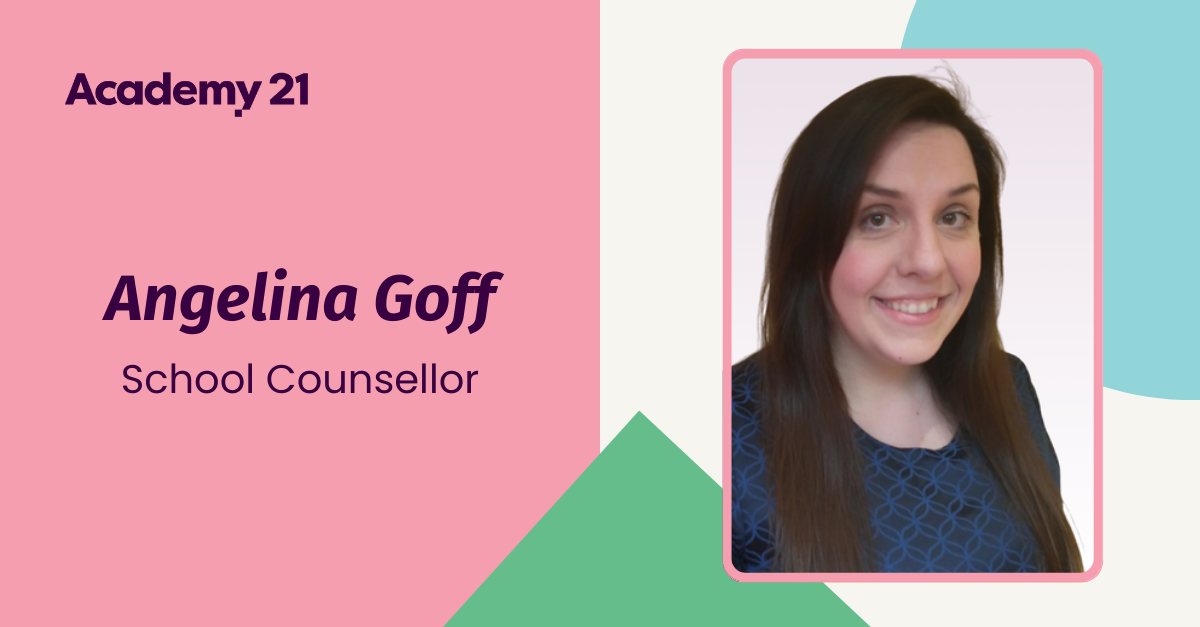
Angelina’s days as a school counsellor at Academy21 and King’s InterHigh are wonderfully varied. In any given week, she may run a wellbeing course, have one-to-one sessions with students, and get in touch with parents for regular check-ins. Angelina works closely with teachers across our school to make sure students feel supported in their emotional wellbeing and their academic progress.
When she’s not supporting students, you can find Angelina outdoors, whether she’s hiking or wild swimming. She enjoys all kinds of crafting and trying new things, and even once learned Grade 1 saxophone from scratch to merit level during a student-led initiative.
What’s your role on the SEN team, and what does your day-to-day look like?
I’m the school counsellor, so my days are all about supporting students’ wellbeing. That might mean running an anxiety management class, having one-to-one chats, or checking in with parents to see how things are going at home. I also work with teachers to make sure students feel supported both emotionally and academically. No two days are ever the same, which keeps it interesting!
What inspired you to specialise in supporting students with special educational needs?
I’ve always loved working with young people and saw early on how much a student’s wellbeing can impact their learning. I wanted to be someone they could turn to — not just in tricky times, but also to help them build confidence and resilience for the future.
What tips would you give parents to help them support their child with SEN at home and in school?
Keep things simple and consistent: routines, downtime, and open conversations go a long way. Listen without rushing to “fix” things, and try out small strategies together like breathing techniques or ways to manage stress. And don’t forget to stay in touch with school staff — we’re always here to work with you as a team!
What’s one thing you wish more people understood about SEN support?
It’s not just for when things feel overwhelming. Counselling can give students tools for everyday life, including helping them manage worries, build self-awareness, and feel more confident in themselves. Early support can make a big difference.
What’s unique about working in SEN at an online school?
One of the big positives about working at Academy21 and King’s InterHigh is that many students feel more comfortable opening up when they’re in their own space at home. It can make conversations flow more naturally. Of course, we have to be creative to make sure students feel connected and not isolated, but the flexibility of online counselling really does open doors for students who might not otherwise have access to this kind of support.
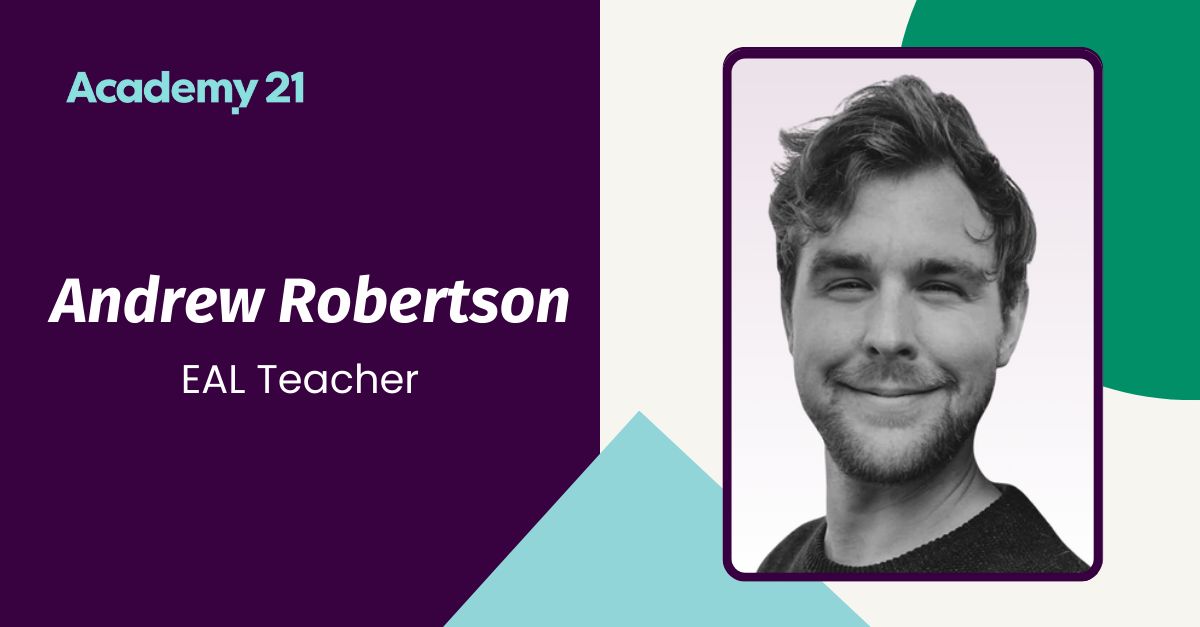
As an EAL teacher and course writer, it’s Andrew’s job to plan engaging lessons that help our international students communicate confidently and improve their spoken English. He also brings that energy to our study skills, education coaching, and social skills sessions to help students build practical strategies for success. His approach to teaching involves plenty of creativity, from grammar practice games to funny debates.
When he’s not teaching, Andrew keeps himself busy playing harmonica, DJing, mountain biking down trails, and indulging his slightly unusual interest in mycology, always on the lookout for interesting mushrooms during his outdoor adventures.
What’s your role on the SEN team, and what does your day-to-day look like?
I’m the EAL course writer and teacher at King’s InterHigh and Academy21, so my leading role involves planning and creating fun, engaging lessons that encourage students to communicate confidently and improve their spoken English skills. I also contribute to the planning, creation, and delivery of study skills lessons and education coaching sessions, helping students develop strategies for time management and organisation. In addition, I support the teaching of social skills lessons, helping students build confidence in communication, teamwork, and forming positive relationships.
One of my favourite parts of the job is finding creative ways to get students talking — sometimes that means turning grammar practice into a game or debating the most controversial question of all: is pineapple on pizza acceptable? Seeing students laugh, connect, and grow more confident reminds me why I love what I do.
What inspired you to specialise in supporting students with special educational needs?
I’ve always been enthusiastic about inclusive education and the belief that everyone learns in their own way. No two students are alike — we all have our own strengths, quirks, and ways of processing the world. What inspires me most is helping students understand and celebrate their uniqueness, rather than feeling defined by it. There’s something incredibly rewarding about watching a student realise that the way they learn isn’t “wrong.” It’s just theirs, and it can be a real source of strength.
What tips would you give parents to help them support their child with SEN at home and in school?
I’d say the biggest thing is to keep the lines of communication open, with your child and with their teachers. We’re all on the same team, and sharing what works (and what doesn’t!) makes a huge difference. Celebrate the small wins, because those really add up over time. Try to build routines that make learning feel calm and predictable, but don’t forget to have a bit of fun along the way too. Most importantly, remind your child that progress doesn’t always look the same for everyone, and that’s completely okay.
What’s one thing you wish more people understood about SEN support?
I wish more people understood that SEN support is not about labelling students, but about empowering them through understanding, patience, and personalised strategies.
What’s unique about working in SEN at an online school?
What I love most about our school is that the online setting allows for a flexible, individualised approach where we can tailor support and pacing much more closely to each student’s needs.
